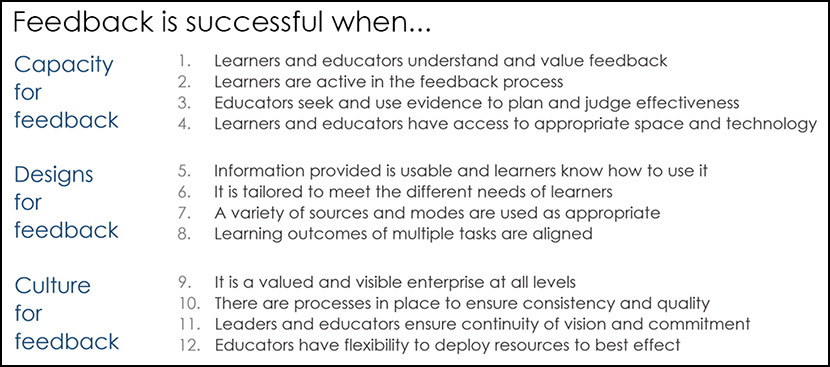Researchers from Deakin’s Centre for Research in Assessment and Digital Learning are seeking to improve feedback practices – and student learning – across Australian universities.
Feedback has the potential to improve student learning significantly, but it is too often underutilised, misunderstood, and a source of frustration for educators and students alike, according to a team of researchers at Deakin University.
The researchers, from Deakin’s Centre for Research in Assessment and Digital Learning (CRADLE), are working with colleagues from Monash University and the University of Melbourne to reshape feedback understandings and practices across the Australian Higher Education sector.
The “Feedback for Learning: Closing the Assessment Loop” project is one of the final projects funded by the former Australian Office for Learning and Teaching.
Professor David Boud and Associate Professor Phillip Dawson led CRADLE’s involvement in the project as co-investigators with a team from Monash University, one of whom subsequently joined the University of Melbourne.
The two explained that assessment feedback for learning is the lynchpin to students’ effective decision making, and the basis of improved learning outcomes. However, no single feedback strategy or model has been shown to work across all contexts.
“The Australian Higher Education sector needs a useful and useable approach for improving feedback for learning,” said Professor Boud.
[testimonial_text]There is a surfeit of models, frameworks, principles and strategies and an expanse of literature exploring feedback for learning, yet university educators have little guidance on how to choose amongst them. Our project aims to improve institutional, educator, and student capacity to stimulate and leverage assessment feedback.[/testimonial_text]
[testimonial_picture name=”Professor David Boud” details=”Deakin’s Centre for Research in Assessment and Digital Learning”]
 [/testimonial_picture]
[/testimonial_picture]Over the course of 18 months, nearly 5,000 students and educators from both Deakin and Monash participated in surveys, focus groups and interviews, giving the project team significant insights into current feedback practices in Australian universities.
“Some good practices in feedback were more widespread than we anticipated, but there is still a long way to go to improve feedback in many courses,” Prof Boud said.
“There has been a shift in feedback away from the old idea – that feedback is about staff giving students comments on their work – to the current one, where there is an explicit focus on improving students’ subsequent work.
“This is what we mean by completing the feedback loop: ensuring that comments lead to student action.”
“Feedback is only feedback where it leads to change. We need to see that change,” said Associate Professor Dawson.
The project aimed to go beyond simply identifying current feedback practices and challenges. It was designed to have a direct impact on feedback practices in universities through, firstly, understanding the current state of play in feedback across the disciplines. Secondly, it aimed to identify conspicuously good practice, as identified by students, and then make sure this knowledge was disseminated widely. Thirdly, it aimed to identify key features of good assessment from the study and the literature.
To support educators and institutions to pursue good feedback practice, the project team has developed a range of resources, including a set of detailed case studies of excellent feedback practice on its “Feedback for Learning” website, which are drawn from a wide variety of disciplines. They also describe 12 conditions for success, drawn from the case studies, which may facilitate the success of assessment feedback when present in a learning context.

“This is not to suggest that these are the only conditions, nor that they all need to be simultaneously present to ensure success,” said Professor Boud.
“But we know that these conditions can play a role in facilitating successful feedback practices.”
The case studies describe feedback in units across Deakin and Monash, which have both been nominated by students as having good feedback practices and in which the feedback processes are based on well-evidenced principles from the research literature.
“We have deliberately emphasised those cases that involve large classes and early year units, as it is these that colleagues tell us are some of the most difficult ones in which to do feedback well,” said Professor Boud.
The team has shared key findings and practice implications from the project with institutions across Australia via a national roadshow. Nearly 500 academics and senior leaders took part in practical workshops, roundtables and an online webinar designed to help educators and institutions consider feedback practices in their own contexts.
“Educators have an important role to play in improving feedback practices – and simply being mindful of the aim of feedback can be a good place to start.
“We all need to think of feedback as a process which leads to learning – that is, improved student work – and not an isolated act by staff that accompanies marking and is involved in correcting it or justifying a grade.”
Centre for Research in Assessment and Digital Learning
The Centre for Research in Assessment and Digital Learning (CRADLE) investigates improvements in higher education assessment in the context of a rapidly expanding digital environment. Led by Professor David Boud, CRADLE’s main role is to research assessment practices in the changing settings of education, which are increasingly embracing digital learning.
More information:
- Feedback for learning website
Published by Deakin Research on 24 April 2018



